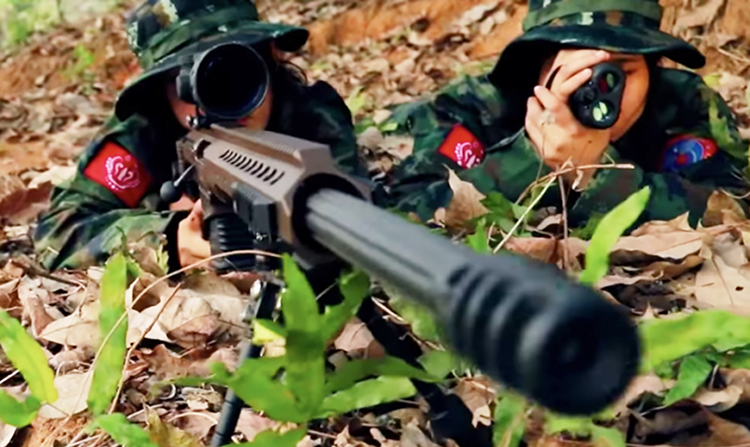- IDPs in Kyauktaw struggle with collapsing shelters amid aid shortages
- Travel restrictions deny Arakanese youth access to higher education
- Motorists fined K30,000 for traffic violations in AA controlled areas
- Inmates escape from Kyaukphyu Prison amid heightened security
- Arakan farmers struggle as paddy market collapses, debts mount
Is Peace in Arakan State merely a dream?
The Tatmadaw and the government always urged the AA to engage in political dialogues rather than taking up arms and demanding their rights. However, fighting against the government for their own rights is what some Arakanese now prefer.
15 May 2019

Nay Myo Linn | DMG
With the title “Statement for Ceasefire and forever peace”, the Tatmadaw declared a unilateral ceasefire for five regional military commands except Western Command in Arakan state. The announcement came on December 21 and the ceasefire was in effect for four months from December 21, 2018 to April 30, 2019.
There were fierce battles between the Tatmadaw and Arakan Army (AA) before the proclamation was issued by the Tatmadaw. Despite the efforts of residents including AA and other armed ethnic groups to be included in the ceasefire, they were denied participation.
The Tatmadaw’s reason for excluding Arakan State from the ceasefire was because the terrorist group ARSA launched attacks in Maungdaw region from 2016 to 2017 and still operates in the region. This resulted in a gross escalation of armed conflicts, some even taking place near villages.
Following the ceasefire issued by the Tatmadaw, four police outposts in Buthidaung Township were attacked by the AA on January 4, in the aftermath police were killed and some were injured and weapons were commandeered.
The AA said that they attacked these outposts because many civilians were brutally tortured where Tatmadaw troops were positioned and border guard police outposts were under siege.
The Tatmadaw and government were not satisfied with the attack. That’s why the president’s office on that day announced to crackdown on insurgents ramping up the military’s vigor, collaborating with police and using military helicopters.
In addition, State Counsellor Daw Aung San Suu Kyi directed the Tatmadaw to fight against the AA “effectively, quickly and decisively.”
Later the Tatmadaw attacked the AA in Arakan state with heavy forces. The battles dramatically heightened day by day producing extreme collateral damage among many innocent civilians.
Initially, the Tatmadaw and the AA agreed to sign preliminary bilateral ceasefire agreements, but it was broken when the government did not accept it because the AA attacked four police outposts.
The government wanted the AA to sign the commitment. However, the AA did not accept what the government wants. The AA believes that only bilateral agreements can pave the way to further political dialogues. Yet, their peace talks show negative results.
The government will accept the bilateral agreement if the AA agrees to the provisos in the bilateral agreement, spokesperson of the President Office U Zaw Htay said in a press conference held in Nay Pyi Taw on March 29.
But there is little hope this would happen because the seven Northern Alliances including the AA denounced the NCA and announced that they will hold a new peace accord led by the “Wa” group.
The AA is trying to keep its foothold in Arakan State. Both the Tatmadaw and the government do not accept this action. Arakan State is an indigenous area and trying to establish a niche in that area is a threat to security of the country, so the government is taking the necessary action to uphold security, said Dr Tin Myo Win, vice chair of the NRPC.
The Tatmadaw and the government always urged the AA to engage in political dialogues rather than taking up arms and demanding their rights. However, fighting against the government for their own rights is what some Arakanese now prefer.
The Arakan National Party (ANP), won the 2015 general election in Arakan State. So, the ANP and local people demanded to give the rights to the ANP to form the cabinet and to appoint a person from the ANP for the post of Arakan State chief minister. But the NLD government vetoed their demand and appointed an NLD member as the chief minister of the Arakan State which resulted in public demonstrations and the people’s disenchantment with politics.
People thought that their attempts via political means would allow the election winner from the ANP to form the cabinet, but they were sadly mistaken. They believe now that any political approach will not fulfill their demands. Thus, their interest in politics is gradually waning and they see the AA as the saviors who will deliver their rights.
That’s why people prefer to carry out an armed struggle in lieu of a political approach, and the supporters and members of the AA have been on the upswing. Arakanese believe that the AA will make their dreams come true.
The government and the eight non-signatories of the NCA including the AA met at the NPRC on March 21. One of the topics in their discussion was to try to reduce the ongoing battles.
However, the battles between the Tatmadaw and the AA that started early December are intensifying now. The battles forced about 40,000 people to refugee camps and caused collateral damage, at least 15 civilians died.
Feeling sympathetic towards the IDPs who are worried about their security and troubles, Arakanese people called off their annual event of the Arakan traditional Water Festival this year in Sittwe, Buthidaung, Maungdaw, Yangon and other locations. The consequence of battles on people is exorbitantly high.
Local residents in the region want the wars to end so they can live peacefully and prosper in their homeland. The only way to reach this goal is to engage in political dialogues after the dust of war has settled.






.jpg)













